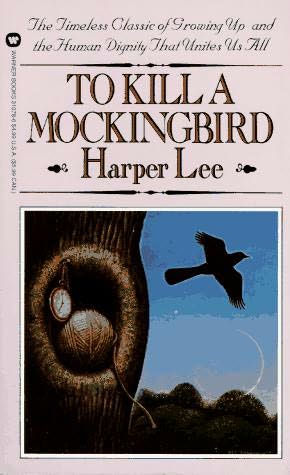--The blurb--
""Shoot all the bluejays you want, if you can hit 'em, but remember it's a
sin to kill a mockingbird". This is a lawyer's advice to his children
as he defends the real mockingbird of this story - a black man charged
with raping a white girl in the Deep South of the 1930s."
--The review--
Literature professors and other book lovers around the world, since time immemorial, have long argued about the purpose of literature. Is it to teach? To entertain? To transport, to allow for escapism? To reassure you that there's someone out there who has once felt as you now do? Or something else?
Harper Lee was working at a very sensitive time for America - and yet somehow, in the turbulence of the late 1950s and early 1960s, she managed to encapsulate all of these things in what is essentially her only work, To Kill A Mockingbird. It's certainly worth doing something only once if you do it right the first time, and this is proved by Lee's lingering legacy. Her only novel leaves an ongoing flavour in the mouth and mind as all five senses try to wrap themselves around the warmth of the Alabama summers, the noises of the courtroom, the taste of Coca-Cola out of a brown paper bag, the smell of Miss Maudie's beloved azaleas, and the unending motif of calm protagonist Atticus leaning over a book or newspaper. The author's powers of description and observation mean that the transportation of the reader is complete; it is this, combined with the compelling plot line, which make it difficult to extract oneself from what is being told.
Entertainment is not so prevalent in To Kill A Mockingbird in terms of laughs; Lee is, after all, dealing with a serious subject. The characters are strong, touching and eccentric in equal measure, and contrast each other enough to create real variety, while the plot is precise and carefully executed. Tension is built up successfully as Lee hangs onto control of the dénouement, throwing in a twist just as the reader believes that they know what will happen. This is not to say that the writer scores perfectly on all counts, however: at times the narration is too unrealistic to possibly come from the mouth of an eight-year-old, even a precocious one (a third-person omniscient narrator, or even the first-person voice of an older child, would have perhaps been better), and further expansion on the Boo Radley subplot would have added even further mystery. None of these flaws, though, prevent the reader from being riveted throughout.
At once the reader is somewhere else, and at the same time reminded of their life's own unfairnesses (even if only in the sense of how they diminish by comparison to the novel's main unfairness). But Lee does not encourage us to wallow - to the contrary, we are guided to take inspiration from the sage Atticus, who dispenses life advice throughout the novel at appropriate intervals, without seeming interfering. To Kill A Mockingbird perhaps contains life's most important lessons, but the reader does not feel patronised by this, as the author's points are well-made.
It is therefore from the combination of all of the above "purposes of literature" that To Kill A Mockingbird has truly earned its place in the annals of literary acclaim. All should be urged to read it - and not only that, but to read it more than once.






2 comments:
Bianca,
I have a question from this book. The book ever address why Jean Louise and Jem called their father Atticus?
Hi besams,
Thanks for stopping by!
I had wondered the same thing. And no, the book doesn't address this. It does seem odd, doesn't it? With my "English teacher" hat on I'd say this is a very deliberate choice by the author to emphasise formality, distance, and Atticus' monolithic nature.
Certainly we're not the first to have asked it, and others have come up with their own answers. Other suggestions I've seen imply that this symbolises how Atticus, Jean Louise and Jem treat each other as equals; that use of the word "dad" would remind Atticus of the loss of his wife/their nuclear family life together; and that the children had no mother to direct them to call him "Dad" or "Father", not Atticus.
There are definitely plenty of interesting theories out there, and the discussion of them is without doubt one of the joys of reading.
Post a Comment